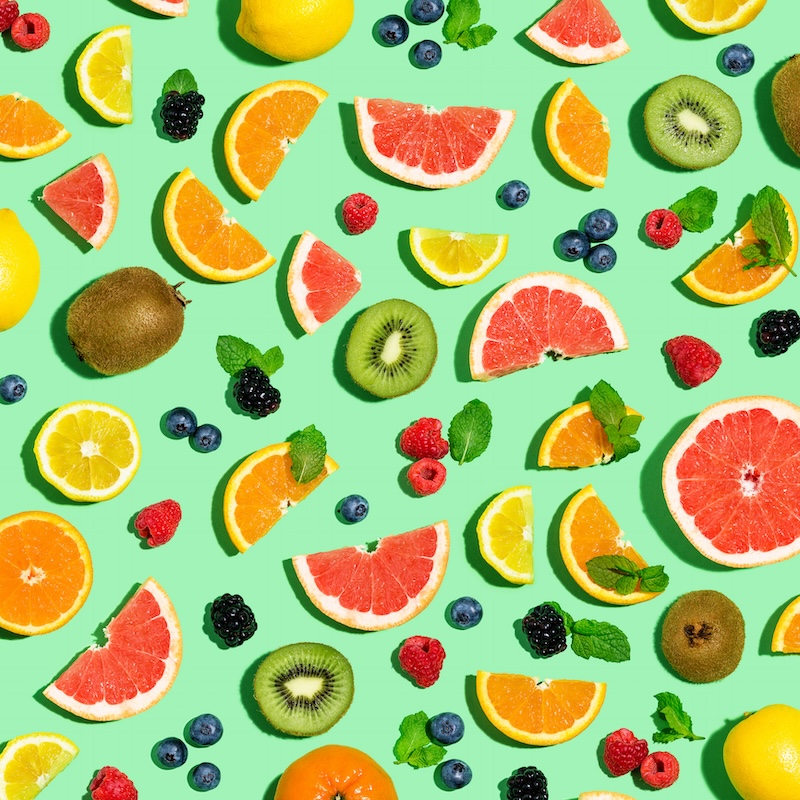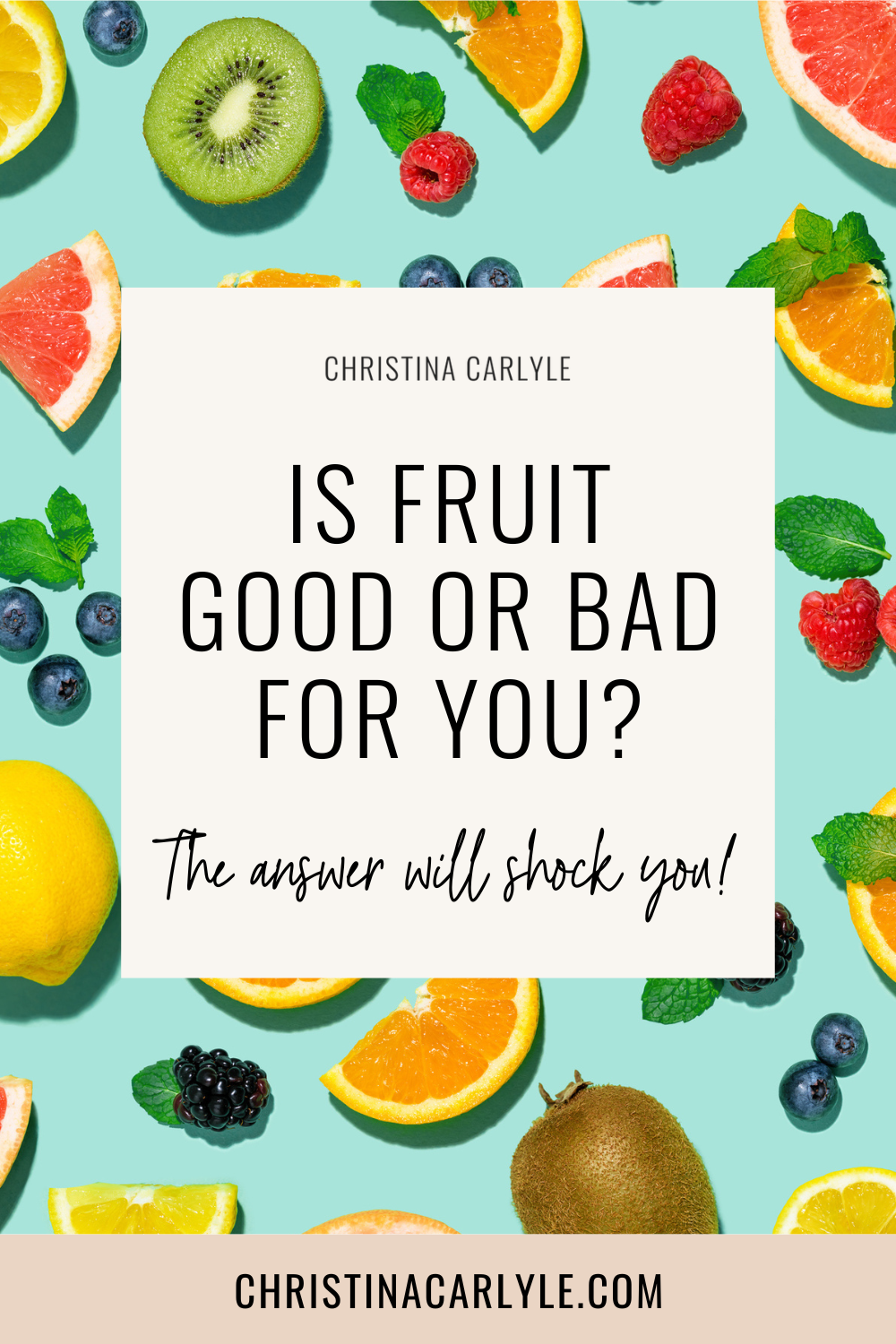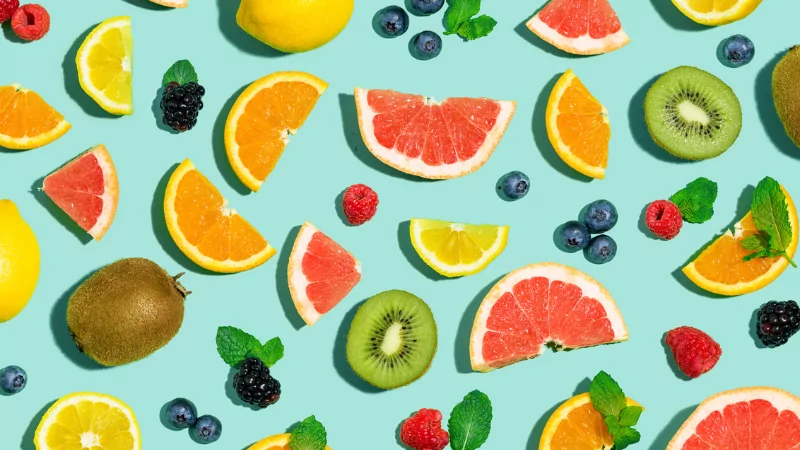Last Updated on April 4, 2024
Wondering is fruit good for you or not? This posts addresses all of the pros and cons of fruit so you can see if fruit is good for you (or not). Plus, I’m sharing my best tips to enjoy it so you can maximize benefits and avoid issues.
Is Fruit Ok to Eat?
The answer is YES, assuming you’re eating whole fruits, not eating too much, and don’t have pre-existing issues that would be made worse by eating fruit…
Generally speaking, YES, fruit is considered very good for you as part of a balanced diet. That’s because fruits are high in essential vitamins, minerals, fibers, antioxidants, and other plant chemicals which are beneficial and necessary for overall health.
Fruit provides natural sugars for energy and are low in calories, making them a healthy option for a sweet snack. Eating a variety of fruits can contribute to better hydration, gut health, improved digestion, and a reduced risk of chronic diseases such as heart disease, certain cancers, and type 2 diabetes.
However, all foods, drinks, and consumables – including fruit – have a ‘front and a back’ meaning they have benefits but can also cause potential issues in some people.
Fruit has a ‘back’ and could potentially cause issues and be considered ‘bad’ for you. Here’s how…

What makes fruit bad for you?
There are several things that could potentially make fruit have negative affects on you and your health. They are:
Stripping out the fiber – Fiber helps prevent blood sugar spikes. When you strip out the fiber i.e. process or juice the fruit you increase the glycemic load and will spike your blood sugar 4 times faster than if you eat the whole fruit. So skip drinking fruit juice and eat the fruit whole (with skin where applicable)… so eat the whole apple or pear but peel the bananas and oranges. Make sense?
Eating (too much) High Glycemic Fruit – High glycemic fruits, such as watermelon, pineapple, and ripe bananas, can lead to rapid spikes in blood sugar levels due to their high sugar content and relatively low fiber content… and this occurs naturally eating the whole fruit… not juicing it. This rapid rise in blood sugar can trigger a corresponding increase in insulin production, setting you up for crashes and cravings and contributing to the possibility of experiencing insulin resistance over time. Consistently elevated blood sugar and insulin levels can promote inflammation and increase the risk for metabolic disorders like type 2 diabetes and cardiovascular disease. Additionally, frequent consumption of high glycemic fruits without adequate fiber or protein to slow digestion may fail to provide sustained energy and lead to subsequent crashes, impacting overall energy levels and mood.
Eating too much (serving size) – Consuming too much fruit means you’re getting a lot of fructose which slams the liver and impacts blood sugar levels. Fructose, a type of sugar found in fruits, honey, and high-fructose corn syrup (HFCS), can have negative effects on the liver and gut when consumed in excessive amounts. Fructose is well known to affect the liver similarly to alcohol… Here are some ways fructose can affect the liver (and gut) negatively:
- Increased Fat Storage: Unlike glucose, which can be metabolized by most cells in the body, fructose is primarily metabolized in the liver. Excessive consumption of fructose can overwhelm the liver’s capacity to metabolize it. When the liver is overloaded with fructose, it converts it into fat (triglycerides) through a process called de novo lipogenesis (DNL). This can lead to increased fat accumulation in the liver, a condition known as non-alcoholic fatty liver disease (NAFLD).
- Insulin Resistance: High fructose intake has been associated with insulin resistance, a condition where cells become less responsive to the effects of insulin. Insulin resistance can lead to elevated blood sugar levels, which can further contribute to fat accumulation in the liver.
- Inflammation: Excessive fructose consumption may promote inflammation in the liver. Inflammation is a key factor in the progression of liver diseases such as NAFLD to more severe conditions like non-alcoholic steatohepatitis (NASH) and cirrhosis.
- Increased Risk of Liver Disease: Prolonged consumption of high amounts of fructose has been linked to an increased risk of developing liver diseases such as NAFLD and NASH. These conditions can progress to more severe liver damage, including liver fibrosis, cirrhosis, and even liver failure.
- Altered Gut Microbiota: Some studies suggest that high fructose intake may alter the composition of gut microbiome leading to an imbalance in beneficial and harmful bacteria and fungus. This imbalance could contribute to liver inflammation and metabolic dysfunction. If you experience adverse symptoms, like bloating, gas, cramping, etc. then gut health needs to be a priority and fruit should be limited until gut health issues are resolved.
It’s important to note that moderate consumption of fructose from whole fruits is generally not harmful and can be part of a healthy diet due to the presence of fiber, vitamins, and other nutrients. However, excessive consumption of fructose can be problematic especially if someone has existing liver and/or gut issues. So anyone with liver or gut issues should minimize fruit intake.
Fruit can feed pathogens – For those with candida overgrowth or imbalanced gut microbiome/pathogenic bacteria, fruit consumption can be problematic. While fruits offer essential nutrients and fiber, the fructose can exacerbate digestive issues and symptoms by feeding yeast or disrupting gut microbiota balance further. Some fibrous fruits can also cause discomfort due to fermentation in sensitive digestive systems. In this case, moderation and consuming lower-sugar fruits like berries is often recommended and necessary for healing. Consumption of fruit can make these stealth infections worse or resistant to treatment in the future. This is a common reason why people don’t “feel better: even though they’re eating healthy things, like fruit.

How Eat Fruit for the Best Results & To Avoid Issues
Fruit is nutritious, delicious and is the best option if you’re craving a sweet treat. Here are my top tips to enjoy fruit and avoid potential issue:
Eat the Whole Fruit – Remember, mother nature makes no mistakes. So if you’re eating fruit (on it’s own) eat the fruit whole, as intended so get the nutrients and fibers needed for a healthy, balanced diet. So eat the peel where applicable for example, eat the apple and pears with the skin on… but obviously peel things that shouldn’t be consumed like bananas and oranges.
Eat Fruit in Season – Fruit in Season Now have the most nutrients and best flavor. So they give you the most bang for your buck.
Eat Moderate / Low Glycemic Options – Choosing low glycemic fruit helps prevent blood sugar spikes. So if you have hormone issues or are prone to cravings, opt for low glycemic choices. Here’s a list of the low glycemic fruits (and which are high on the Glycemic Index) so you know what to eat and what to avoid.
Combine them with Protein – Pairing fruit with protein helps negate blood sugar spikes. So if you’re prone to cravings, adding protein alongside your fruits can help. BUT if you have gut issues, especially gut inflammation, leaky gut, microbiome dysbiosis, or a parasite or pathogen (like candida) this can potentially cause symptoms like cramping, gas, bloating, etc. In that case, I’d recommend avoid pairing proteins with fruit, sticking to low glycemic, low sugar options, like berries and grapefruit, and booking a one on one consult so I can assist with diagnosing what’s going on and customize a plan that’s best for you… different gut issues require different treatment plans and have their own dietary protocols.
Eat the fruits that are best for your Metabolic Type – Different metabolic types respond differently to different sugars and fibers found in fruits. Some do better with a lot of fruit… others not so much. When you give your metabolism the nutrients it needs you can maximize benefits and avoid issues like weight gain, GI, liver, and hormone issues, etc. My Metabolic Type Training – complete with Metabolic Type Quiz – explains more.
I hope that helps clear up the confusion if fruit is good for you – or not. It totally depends on what’s going on with your unique needs and reactions to them and if you have pre-existing hormone, gut, and/or liver issues.
If you have any questions let me know in the comments.
Your Coach & Biggest Cheerleader,
![]()
Pin this to Pinterest so you’ll have it forever,

You may also like:






